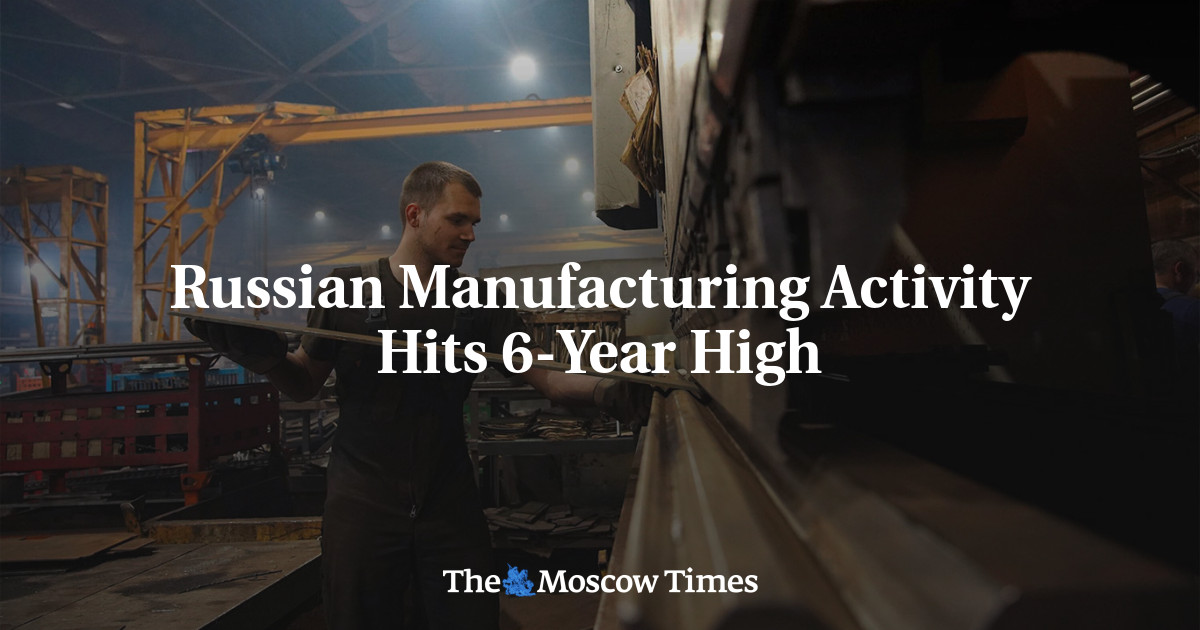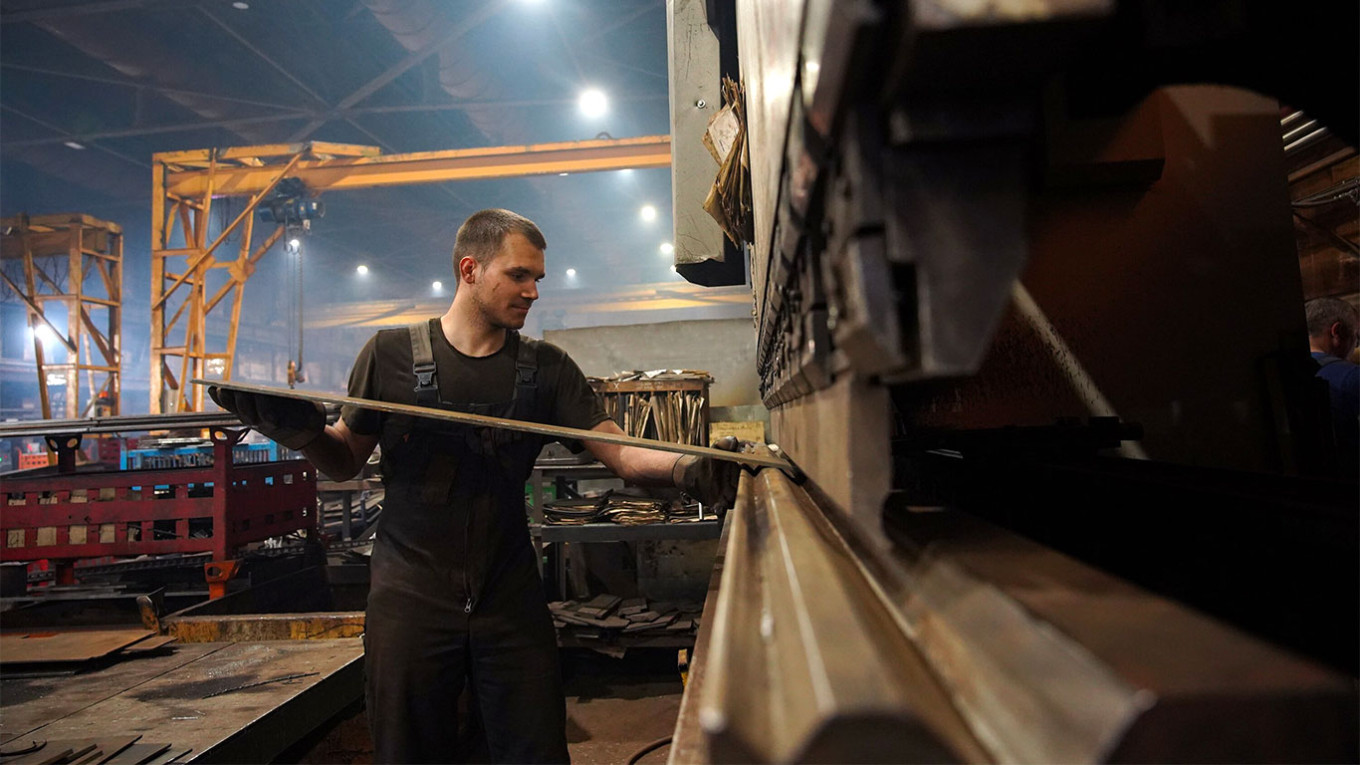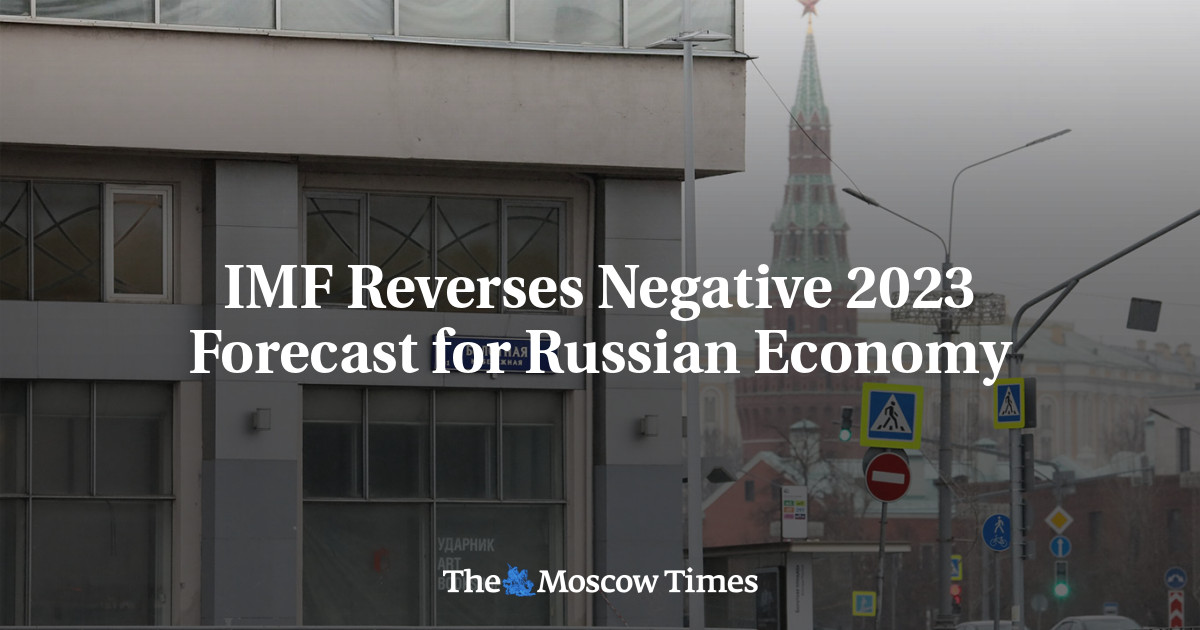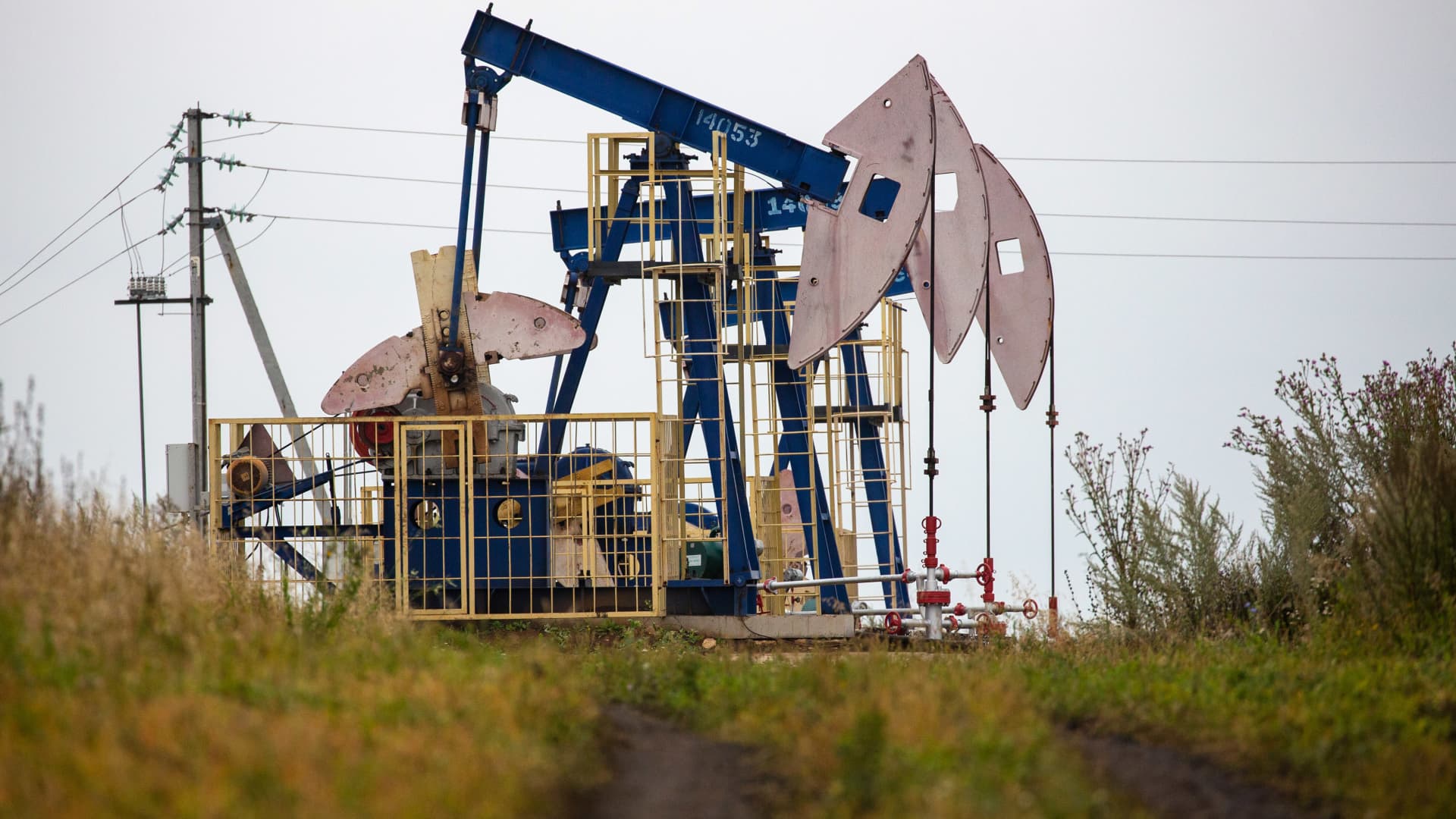You are using an out of date browser. It may not display this or other websites correctly.
You should upgrade or use an alternative browser.
You should upgrade or use an alternative browser.
Are Sanctions Hurting Russia?
- Thread starter Petr
- Start date
Petr
Administrator
The Moscow Times is anything but a pro-Russian source, so this comes from a "hostile witness":

 www.themoscowtimes.com
www.themoscowtimes.com
Updated: 2 hours ago

The Tonar engineering plant in Russia's Moscow region.Alexander Avilov / Moskva News Agency
Russian manufacturing firms recorded their fastest rate of growth last month in almost six years due to new export orders and increased demand from domestic customers, according to a business survey published Thursday by S&P Global.
Despite Western sanctions imposed on Russia over its invasion of Ukraine, “firms expanded their input buying at the fastest pace since January 2017,” S&P Global said.
The seasonally adjusted S&P Global Russia Manufacturing Purchasing Managers’ Index rose in November to 53.2 from 50.7 in October.
“Greater new sales spurred renewed increases in employment and inventories, with input buying expanding at a steep rate,” the report said.
According to the survey, firms also expanded their workforce numbers last month — in contrast with an October decline after Russian President Vladimir Putin announced a "partial mobilization" to draft 300,000 reservists for the war in Ukraine.
Western sanctions imposed on Moscow over the war in Ukraine have helped tip Russia into a recession, with the economy shrinking 1.7% in the first nine months of the year.

Russian Manufacturing Activity Hits 6-Year High - The Moscow Times
Russian manufacturing firms recorded their fastest rate of growth last month in almost six years due to new export orders and increased demand from domestic customers, according to a business survey published Thursday by S&P Global.
Russian Manufacturing Activity Hits 6-Year High
Updated: 2 hours ago

The Tonar engineering plant in Russia's Moscow region.Alexander Avilov / Moskva News Agency
Russian manufacturing firms recorded their fastest rate of growth last month in almost six years due to new export orders and increased demand from domestic customers, according to a business survey published Thursday by S&P Global.
Despite Western sanctions imposed on Russia over its invasion of Ukraine, “firms expanded their input buying at the fastest pace since January 2017,” S&P Global said.
The seasonally adjusted S&P Global Russia Manufacturing Purchasing Managers’ Index rose in November to 53.2 from 50.7 in October.
“Greater new sales spurred renewed increases in employment and inventories, with input buying expanding at a steep rate,” the report said.
According to the survey, firms also expanded their workforce numbers last month — in contrast with an October decline after Russian President Vladimir Putin announced a "partial mobilization" to draft 300,000 reservists for the war in Ukraine.
Western sanctions imposed on Moscow over the war in Ukraine have helped tip Russia into a recession, with the economy shrinking 1.7% in the first nine months of the year.
Petr
Administrator
Coming from an anti-Russian source:

 www.themoscowtimes.com
www.themoscowtimes.com
Sophia Sandurskaya / Moskva News Agency
The Russian economy is predicted to grow 0.3% in 2023 despite setbacks from unprecedented Western sanctions over the Ukraine invasion, according to data released by the International Monetary Fund (IMF) on Monday.
Russia’s projected economic growth stands in sharp contrast with the 2.3% contraction forecast by the IMF in October and marks an improvement from the 2.2% decline recorded by the sanctions-hit economy in 2022.
If the 2023 projection is realized, it would put Russia ahead of Germany and the U.K., whose economies are projected to grow by 0.1% and shrink by 0.6%, respectively.
Compared with its previous report in October, the IMF’s latest global economic forecast paints a much brighter picture for the global economy overall, which is projected to grow by 2.9% in 2023 compared to its earlier prediction of 2.7%.
But the financial agency has also named a potential escalation of the war in Ukraine to be “a major source of vulnerability, particularly for Europe and lower-income countries.”
While the European Union was able to store enough gas to avoid shortages and set lower-than-expected gas prices this winter, the IMF predicts the bloc’s fortunes could reverse in the year ahead as it may face challenges in attempting to refile the gas storage for next winter amid radically diminished Russian gas flow and China’s growing energy demands.
A potential failure to extend the UN-brokered Black Sea grain export agreement between Ukraine and Russia could worsen food insecurity in lower-income countries, leading to increased social unrest, the IMF warned.

IMF Reverses Negative 2023 Forecast for Russian Economy - The Moscow Times
The Russian economy is predicted to grow 0.3% in 2023 despite setbacks from unprecedented Western sanctions over the Ukraine invasion, according to data released by the International Monetary Fund (IMF) on Monday. Russia’s projected economic growth stands in sharp contrast with the 2.3%...
IMF Reverses Negative 2023 Forecast for Russian Economy
2 hours agoSophia Sandurskaya / Moskva News Agency
The Russian economy is predicted to grow 0.3% in 2023 despite setbacks from unprecedented Western sanctions over the Ukraine invasion, according to data released by the International Monetary Fund (IMF) on Monday.
Russia’s projected economic growth stands in sharp contrast with the 2.3% contraction forecast by the IMF in October and marks an improvement from the 2.2% decline recorded by the sanctions-hit economy in 2022.
If the 2023 projection is realized, it would put Russia ahead of Germany and the U.K., whose economies are projected to grow by 0.1% and shrink by 0.6%, respectively.
Compared with its previous report in October, the IMF’s latest global economic forecast paints a much brighter picture for the global economy overall, which is projected to grow by 2.9% in 2023 compared to its earlier prediction of 2.7%.
But the financial agency has also named a potential escalation of the war in Ukraine to be “a major source of vulnerability, particularly for Europe and lower-income countries.”
While the European Union was able to store enough gas to avoid shortages and set lower-than-expected gas prices this winter, the IMF predicts the bloc’s fortunes could reverse in the year ahead as it may face challenges in attempting to refile the gas storage for next winter amid radically diminished Russian gas flow and China’s growing energy demands.
A potential failure to extend the UN-brokered Black Sea grain export agreement between Ukraine and Russia could worsen food insecurity in lower-income countries, leading to increased social unrest, the IMF warned.
Petr
Administrator
Of course, it is still too early for the Russians to gloat at this stage. They are going to need all their capitalist and outlaw (or law-avoiding) inventiveness to be able to defeat these sanctions:

 www.cnbc.com
www.cnbc.com
PUBLISHED FRI, FEB 3 202312:51 AM
Sumathi Bala
Sanctions imposed on Russian crude oil have so far “failed completely” and new price caps could prove immaterial as well, analysts told CNBC.
The European Union is planning to ban imports of refined petroleum products from Russia, including diesel and jet fuel, from Sunday.
The 27-member bloc has already banned the purchase and import of sea-borne Russian crude oil since December.
In addition, the bloc — along with its allies in the Group of 7 and Australia — has set a price cap on Russian seaborne crude oil, which bars the use of Western-supplied maritime insurance, finance and other services unless they are sold below $60 per barrel.
They are part of global efforts to curb Moscow’s ability to raise funds for its war in Ukraine.
The price cap “was invented by bureaucrats with finance degrees. None of them really understand oil markets,” Paul Sankey, president and lead analyst at Sankey Research, told CNBC’s “Street Signs Asia” on Thursday.
“Its been a total bomb, it has failed completely.”

Sankey underlined it has been tough for oil markets because Russian oil supply hasn’t really been interrupted and “they’ve sustained exports at high levels.”
“I heard it from a great source that the Saudis have been asking around as to how come Russian oil is still flowing,” he said.
“That brings the question of what will happen with the sanctions coming up on products, because it just doesn’t seem to work.”
Even though volume has remained robust, the price of Russia’s Urals oil blend has fallen since before the war. Average price for Russia’s Urals oil blend was $49.48 per barrel in January this year, according to Reuters which quoted the finance ministry. That’s below the price cap of $60 set by the EU and G-7, and down 42% from January last year, according to Reuters.
Ahead of the proposed price caps on Russia’s refined products on Feb. 5, member state's had yet to agree on a price cap, according to Reuters. It is hoped that a deal can be reached by Friday.
The report by the independent Finnish think tank found the first month of the EU’s ban on seaborne imports of Russian crude and the G-7′s price cap had cost Moscow an estimated 160 million euros ($174.3 million) per day.
It said those measures were largely responsible for a 17% fall in Russia’s earnings from fossil fuel exports in the final month of 2022.
“The crude price cap was pretty inconsequential,” Hari told CNBC’s “Squawk Box Asia” on Thursday.
“I think the refined product caps that they’re planning — about a $100 [per barrel] for diesel and clean products and perhaps around $45 for dirty fuels like fuel oil — are probably going to be immaterial as well.”
Russian oil will find its way into the markets that are “still welcoming it” like China and India, according to Hari.
“China and India have benefited quite a big deal last year from heavily discounted Russian crude prices and the same’s going to happen to Russian refined products,” Hari noted, although it could be more complicated for Moscow to find markets for such products, she added.
Both China and India have increased their purchases of Russian oil in the wake of Moscow’s invasion of Ukraine, benefiting from discounted rates.
Sankey further noted “oil friendships are greasy” and there’s a lot of different ways to move Russian oil around the world bypassing the price caps.
“One of the things people have highlighted is look at Malaysian oil. Its crude oil exports to China is at 1.5 million barrels a day,” said Sankey. “Malaysia only produces 400,000 barrels a day. I don’t think that’s Malaysian crude. So there’s plenty of stuff moving around outside these ... theoretical caps.”
Hari highlighted she does not believe oil prices will hit $100 per barrel anytime soon as a result of China’s reopening, but it could happen more gradually.
There’s still a high degree of uncertainty around China’s oil demand, she added.
“The initial boost in Chinese demand is obvious. We are seeing a lot of travel happening domestically, internationally... that’s positive for jet fuel. But when does the Chinese economy actually pick up momentum again? I think that’s a big question.”
— CNBC’s Sam Meredith contributed to this article

Sanctions on Russian crude oil have 'failed completely,' oil analyst says
Sanctions imposed on Russian crude oil have so far have "failed completely" and new price caps could prove immaterial as well, analysts told CNBC.
Sanctions on Russian crude oil have ‘failed completely,’ oil analyst says
PUBLISHED FRI, FEB 3 202312:51 AM
Sumathi Bala
- Sanctions imposed on Russian crude oil have so far “failed completely” and new price caps could prove immaterial as well, analysts told CNBC.
- The European Union is planning to ban imports of refined petroleum products from Russia, including diesel and jet fuel, from Sunday.
- The price cap was “invented by bureaucrats with finance degrees. None of them really understand oil markets,” Paul Sankey, president and lead analyst at Sankey Research, told CNBC’s “Streets Sign Asia” on Thursday. “t’s been a total bomb, it has failed completely.”
Sanctions imposed on Russian crude oil have so far “failed completely” and new price caps could prove immaterial as well, analysts told CNBC.
The European Union is planning to ban imports of refined petroleum products from Russia, including diesel and jet fuel, from Sunday.
The 27-member bloc has already banned the purchase and import of sea-borne Russian crude oil since December.
In addition, the bloc — along with its allies in the Group of 7 and Australia — has set a price cap on Russian seaborne crude oil, which bars the use of Western-supplied maritime insurance, finance and other services unless they are sold below $60 per barrel.
They are part of global efforts to curb Moscow’s ability to raise funds for its war in Ukraine.
The price cap “was invented by bureaucrats with finance degrees. None of them really understand oil markets,” Paul Sankey, president and lead analyst at Sankey Research, told CNBC’s “Street Signs Asia” on Thursday.
“Its been a total bomb, it has failed completely.”

Sankey underlined it has been tough for oil markets because Russian oil supply hasn’t really been interrupted and “they’ve sustained exports at high levels.”
“I heard it from a great source that the Saudis have been asking around as to how come Russian oil is still flowing,” he said.
“That brings the question of what will happen with the sanctions coming up on products, because it just doesn’t seem to work.”
Even though volume has remained robust, the price of Russia’s Urals oil blend has fallen since before the war. Average price for Russia’s Urals oil blend was $49.48 per barrel in January this year, according to Reuters which quoted the finance ministry. That’s below the price cap of $60 set by the EU and G-7, and down 42% from January last year, according to Reuters.
Ahead of the proposed price caps on Russia’s refined products on Feb. 5, member state's had yet to agree on a price cap, according to Reuters. It is hoped that a deal can be reached by Friday.
The report by the independent Finnish think tank found the first month of the EU’s ban on seaborne imports of Russian crude and the G-7′s price cap had cost Moscow an estimated 160 million euros ($174.3 million) per day.
It said those measures were largely responsible for a 17% fall in Russia’s earnings from fossil fuel exports in the final month of 2022.
Price cap on refined oil products
Still, Vandana Hari, founder of analytics firm Vanda Insights, said she too was skeptical about the upcoming restrictions on Russian refined oil products.“The crude price cap was pretty inconsequential,” Hari told CNBC’s “Squawk Box Asia” on Thursday.
“I think the refined product caps that they’re planning — about a $100 [per barrel] for diesel and clean products and perhaps around $45 for dirty fuels like fuel oil — are probably going to be immaterial as well.”
Russian oil will find its way into the markets that are “still welcoming it” like China and India, according to Hari.
“China and India have benefited quite a big deal last year from heavily discounted Russian crude prices and the same’s going to happen to Russian refined products,” Hari noted, although it could be more complicated for Moscow to find markets for such products, she added.
Both China and India have increased their purchases of Russian oil in the wake of Moscow’s invasion of Ukraine, benefiting from discounted rates.
Sankey further noted “oil friendships are greasy” and there’s a lot of different ways to move Russian oil around the world bypassing the price caps.
“One of the things people have highlighted is look at Malaysian oil. Its crude oil exports to China is at 1.5 million barrels a day,” said Sankey. “Malaysia only produces 400,000 barrels a day. I don’t think that’s Malaysian crude. So there’s plenty of stuff moving around outside these ... theoretical caps.”
China reopening
Separately, Hari said China’s sudden reopening is unlikely to move the needle on oil prices in the near term.Hari highlighted she does not believe oil prices will hit $100 per barrel anytime soon as a result of China’s reopening, but it could happen more gradually.
There’s still a high degree of uncertainty around China’s oil demand, she added.
“The initial boost in Chinese demand is obvious. We are seeing a lot of travel happening domestically, internationally... that’s positive for jet fuel. But when does the Chinese economy actually pick up momentum again? I think that’s a big question.”
— CNBC’s Sam Meredith contributed to this article
Dr. Alan James 2.0
Megaphoron
The ZOG collective entity is unintentionally destroying itself. Things designed to hurt others are boomeranging and the immutable laws of nature can only be disregarded for so long....
Last edited:
